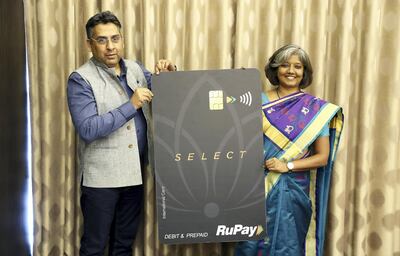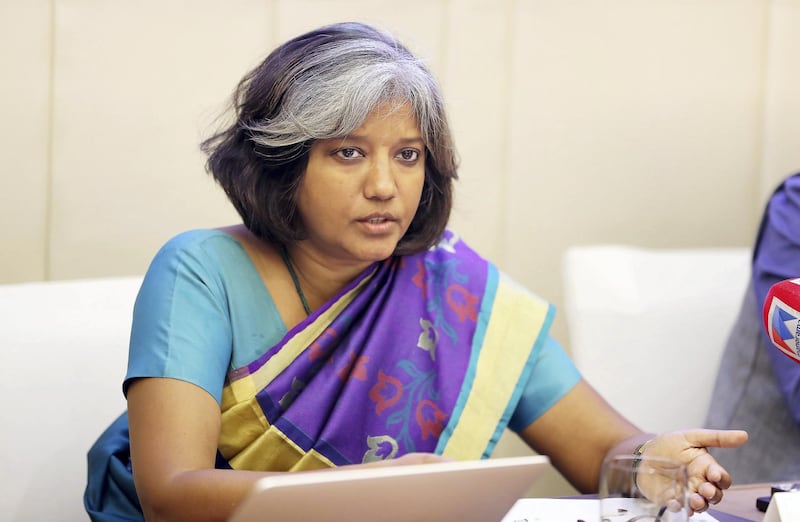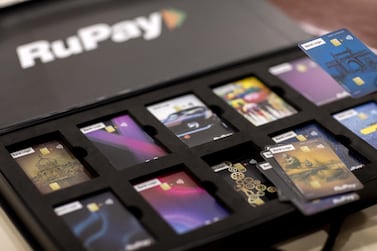National Payments Corporation of India, developer of the RuPay card brought to the UAE last month by Prime Minister Narendra Modi, plans to introduce its UPI digital payment system in the Emirates next year.
“I don't think there's any doubt in anyone's mind that the UAE is one of the most important corridors for India,” said Praveena Rai, chief operating officer of NPCI, at a press conference in Dubai on Thursday. “India is the number one trade partner for UAE and if you look at it vice versa, UAE is the third-largest trade partner for India. The Indian diaspora is a large, significant diaspora here. We have large merchants of Indian origin. And we really believe there is significant interest in the market.”
RuPay and UPI (Unified Payments Interface) are two of the flagship products from NPCI, an umbrella organisation for retail payments systems backed by the Reserve Bank of India and the Indian Banks’ Association.
RuPay was started in 2011 as a home-grown card payment scheme meant to move India closer to a cashless society. RuPay cards are now being issued by more than 1,100 banks with a customer base of more than 600 million. It represents a 35 per cent share of India's card transactions market.
UPI is a mobile platform that can be used to instantly transfer funds between bank accounts, make purchases and remit money. It was introduced in 2016 and is regulated by India’s central bank.
Following Mr Modi’s visit in late August, RuPay is being rolled out to 175,000 merchant locations across 21 businesses and close to 5,000 ATMs in the UAE. Lulu Group started accepting the card across its 74 outlets in the Emirates on August 25. Other merchant partners include NMC Health, Aster, Jashanmal, Landmark Group, Apparel Group, Al Maya Group, Emaar and DP World.
Bank of Baroda, Emirates NBD and First Abu Dhabi Bank will soon start issuing RuPay credit and debit cards in the UAE, but no date for these has been confirmed. Ananda Kumar, general manager at Bank of Baroda for the Middle East, told The National that the bank would start offering the card after the necessary regulatory approvals from the UAE Central Bank, but "definitely before the end of the year".
As part of its push to promote the card in the UAE, NPCI announced that RuPay card holders can get 40 per cent cash back of up to 4,000 Indian rupees (Dh206) per day at merchants in the UAE on the Discover network — about half of all UAE merchants, according to NPCI. The promotion is valid until March 31, 2020.
“The objective is to take the story out to RuPay international card users that their card is accepted in the UAE and they can enjoy experiences that the UAE offers,” said Ms Rai. “We want this to build up through the Dubai Shopping Festival” starting in December, she added.

Indian nationals account for about 30 per cent of the UAE's total expatriate population, according to the Indian Embassy in Abu Dhabi. More than 2 million Indian tourists visited Dubai alone last year, making India the emirate's top tourism source market.
India is also the recipient of the biggest percentage of personal remittances coming from the UAE, accounting for 38.1 per cent of the Dh169.2 billion sent last year, according to the UAE Central Bank's 2018 annual report.
NPCI's new “UPI 2.0,” started in August 2018, enables non-resident Indian bank account holders to send and receive money instantly from their smartphones without the need to enter bank account information or net banking credentials.
NPCI plans to bring UPI to the UAE market next year, and Ms Rai said it would be a more affordable, faster and easier option than other remittance methods.
“UPI 1.0 was largely an India-driven story. As part of UPI 2.0, we’ve also launched remittances as part of that platform functionality,” said Ms Rai. “We believe that for the UAE and India, that is going to be a big opportunity and providing a lot of user benefits and user convenience.”








